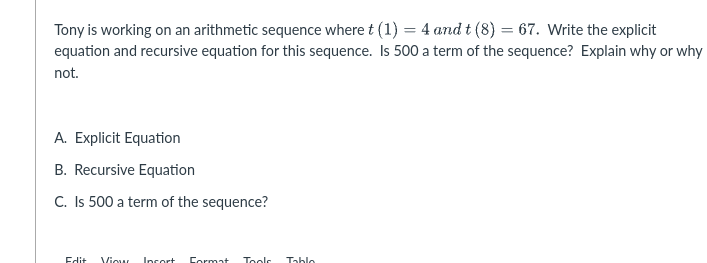Tony is working on an arithmetic sequence where t(1) = 4 and t(8) = 67. Write the explicit equation and recursive equation for this sequence. Is 500 a term of the sequence? Explain... Tony is working on an arithmetic sequence where t(1) = 4 and t(8) = 67. Write the explicit equation and recursive equation for this sequence. Is 500 a term of the sequence? Explain why or why not.

Understand the Problem
The question is asking to formulate both the explicit and recursive equations for an arithmetic sequence given specific values. It also asks whether 500 is a term of this sequence and to provide reasoning for the answer.
Answer
A: $t(n) = 9n - 5$; B: $t(n) = t(n-1) + 9$, $t(1) = 4$; C: No
Answer for screen readers
A. Explicit Equation: $t(n) = 9n - 5$
B. Recursive Equation: $t(n) = t(n-1) + 9$, where $t(1) = 4$
C. 500 is not a term of the sequence.
Steps to Solve
- Identify the first term and the common difference
Given the arithmetic sequence, we know that:
- The first term $t(1) = 4$.
- The eighth term $t(8) = 67$.
Using the formula for the $n$-th term of an arithmetic sequence, we have: $$ t(n) = t(1) + (n-1)d $$
Thus, for $n = 8$: $$ t(8) = t(1) + 7d $$ Substituting known values: $$ 67 = 4 + 7d $$
- Solve for the common difference $d$
Rearranging the equation: $$ 67 - 4 = 7d $$
Which simplifies to: $$ 63 = 7d $$
Now, dividing both sides by 7 gives: $$ d = \frac{63}{7} = 9 $$
- Write the explicit equation
The explicit equation for an arithmetic sequence is given by: $$ t(n) = t(1) + (n-1)d $$
Substituting the values for $t(1)$ and $d$: $$ t(n) = 4 + (n-1) \cdot 9 $$ This simplifies to: $$ t(n) = 9n - 5 $$
- Write the recursive equation
The recursive definition indicates the next term based on the previous one: $$ t(n) = t(n-1) + d $$
Substituting the values gives: $$ t(n) = t(n-1) + 9 $$
With the initial condition: $$ t(1) = 4 $$
- Check if 500 is a term of the sequence
To determine if 500 is a term, we set the explicit equation equal to 500: $$ 500 = 9n - 5 $$
Rearranging gives: $$ 505 = 9n $$
Solving for $n$: $$ n = \frac{505}{9} \approx 56.111 $$
Since $n$ must be an integer, 500 is not a term of the sequence.
A. Explicit Equation: $t(n) = 9n - 5$
B. Recursive Equation: $t(n) = t(n-1) + 9$, where $t(1) = 4$
C. 500 is not a term of the sequence.
More Information
The explicit equation defines the term in relation to its position in the sequence, while the recursive equation provides the relationship between successive terms. The calculation shows that 500 cannot be derived as a term, as it results in a non-integer value for $n$.
Tips
- Misunderstanding the definition of an arithmetic sequence, particularly confusing it with geometric sequences.
- Incorrectly calculating the common difference by misapplying the formula for the $n$-th term.
- Failing to check if $n$ is an integer when testing if a number is a term of the sequence.
AI-generated content may contain errors. Please verify critical information